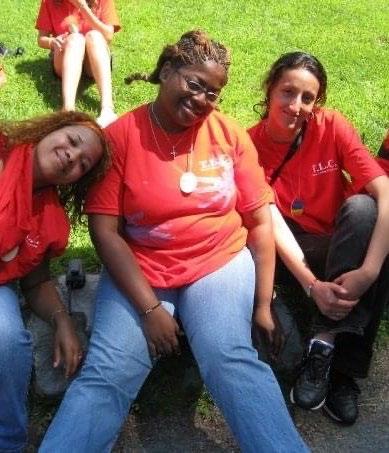Mental Health of People with Vertically Acquired HIV
 Porchia Dees, BS Kimberly Canady, BS Ieshia Scott, MA Grissel Granados, MSW
Porchia Dees, BS Kimberly Canady, BS Ieshia Scott, MA Grissel Granados, MSW
www.thewellproject.org USCHA October 8, 2022
Introductions


 Porchia Dees Kim Canady
Porchia Dees Kim Canady

www.thewellproject.org
Ice Breaker

Learning Objectives
1. Describe the various factors that negatively impact the mental health of people born with HIV and, more specifically, how their unique experiences have created a distinct sense of isolation for this community

2. Describe how social connectedness can positively impact the mental health and overall well-being of people born with HIV
3. Identify opportunities to support social connectedness among people born with HIV in both clinical and community settings
History & Context

Perinatally acquired HIV recognized in 1982

Rates of perinatal HIV cases in the U.S.
From CDC 2013


2020
CDC Surveillance Report,


Long term Survivor Characteristics in 80s-90s Adults: • Shortened life expectancy • Loss of friends/partners • Side effects of early treatment • Challenges with adherence • Drug resistance • Stigma, shame, and secrecy Children: • Life expectancy in 1994 was 7.2 years and increased to 18.2 by 2006 • Loss of parents and/or siblings and childhood friends • Treatment experienced by teenage years leading to resistance • Co-occurring disorders/illnesses • Exclusion from school, group activities, etc. • Some did not know their status until late adolescence
2015
Sandi Gossart Walker,



HIV Services for Children and Adolescents in 90’s-early 2000’s • Awareness and concern about pediatric & perinatal HIV • Specialty pediatric care: – Infectious disease pediatricians – Adolescent medicine supported us through young adulthood • Summer camps for kids living with or affected by HIV • Support groups & social activities • Networks through services for women


Impact of ARTs on Perinatal Population • New perinatal cases became rare • Longer life expectancy for perinatal population • Aging out of pediatrics/adolescent medicine into adult medical care • Shrinking/stagnant size of population • Previously mentioned awareness and concern disappeared • Opportunities for social connections disappeared www.thewellproject.org
Impact on Mental Health
• Overall, children and adolescents living with HIV had poorer neurodevelopmental outcomes
• 25% prevalence of mental health problems among children and adolescents with perinatal HIV, well above that of the general population
• Depressive symptoms in adolescents were best predicted by a combination of negative coping skills and poor neuropsychological functioning
• Key developmental tasks during adolescence:
Consider the future in terms of career, relationships, families, housing, etc.
(Journal of the International AIDS Society, 2013) www.thewellproject.org

–
–
–
Identity development
Build independence


on Mental Health • Unexpected adulthood – Delayed milestones – “what am I doing now?” • Physical impact of long HIV • Inherited trauma from parents • Isolation – Lack of focus or mentions of this population – Not relating to other adult communities
Impact
So what helps?
www.thewellproject.org




Protective Factors

• Mental
services • Socioeconomic support • Holistic
• Social Connectedness www.thewellproject.org
health
case management services
Social Connectedness
Encyclopedia of Geropsychology (2015)

www.thewellproject.org
“Social connectedness is defined as the sense of belonging and subjective psychological bond that people feel in relation to individuals and groups of others”
–
Benefits of Social


• Improve health outcomes (physical health & mental & emotional wellbeing) – Lower levels of anxiety and depression – Higher self-esteem and greater empathy for others www.thewellproject.org Social connectedness generates a positive feedback loop of social, emotional and physical well-being Stanford Medicine, 2014
Connectedness
Social Identity Approach to Health
• Framework that highlights how social identity and social connectedness enhances health
• Beneficial effects of social relationships for cognitive (Haslam et al. 2014b) and mental (Cruwys et al. 2013) health
• Social identification underpins positive forms of influence and support, groups will tend only to enhance health when (and to the extent that) their members identify strongly with them
• If these groups provide a person with stability, meaning, purpose, and direction, then this will typically have positive implications for that individual’s mental health

www.thewellproject.org


in Sense of Belonging • We are like unicorns – “You’re the only one I know” – “I honestly thought you all died” • Don’t fit into age-defined spaces • Unique experiences • “Small” population www.thewellproject.org
Challenges
Our Response



www.thewellproject.org

What Support We Need • Financial support to create our own spaces • Mentoring support • Facilitation to support connections • Camps for us as adults • Trainings for staff on our community • Research and data www.thewellproject.org

www.thewellproject.org

How can YOU help within your role and local or national or international community? What CAN you do? What do YOU commit to doing? www.thewellproject.org





Thank you! For more information: • www.thewellproject.org • Subscribe to our newsletter! Follow us on social media •
•
•
•
Contact information: Grissel Granados ggranados@thewellproject.org
www.Instagram.com/thewellprojecthiv
www.facebook.com/thewellproject
www.youtube.com/thewellprojecthiv
www.twitter.com/thewellproject
www.thewellproject.org
 Porchia Dees, BS Kimberly Canady, BS Ieshia Scott, MA Grissel Granados, MSW
Porchia Dees, BS Kimberly Canady, BS Ieshia Scott, MA Grissel Granados, MSW

 Porchia Dees, BS Kimberly Canady, BS Ieshia Scott, MA Grissel Granados, MSW
Porchia Dees, BS Kimberly Canady, BS Ieshia Scott, MA Grissel Granados, MSW


 Porchia Dees Kim Canady
Porchia Dees Kim Canady






































